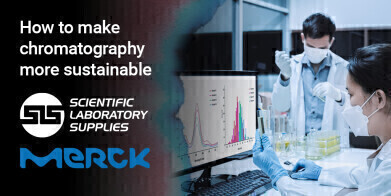Chromatography
How to make chromatography more sustainable
Mar 21 2023
The aim of green chemistry is to reduce the chemical related impact on human health and virtually eliminate contamination of the environment through dedicated, sustainable prevention programs.
Green chemistry searches for alternative, environmentally friendly reaction media whilst striving to increase reaction rates and lower reaction temperatures. The green chemistry concept applies innovative scientific solutions to solve environmental issues posed in the laboratory.
As one of the most widely used methods, liquid chromatography offers the greatest possibility to provide green solutions for laboratory practices. It is a widely used analytical technique in various fields such as pharmaceuticals, biotechnology, food & beverage, environmental monitoring and more.
The most popular type of liquid chromatography is reversed phase (~>75%), which thus far is not considered a 'green' analytical method due to its reliance on large volume columns and solvents such as acetonitrile. However it is possible to modify the mobile phase composition to make chromatography more sustainable without compromising performance of chromatographic separation. Options include:
- Use eco-friendly solvents: One of the biggest environmental impacts of liquid chromatography is the use of solvents. Replacing hazardous solvents with more environmentally friendly options such as water, ethanol, or other organic solvents that are safe, non-toxic, biodegradable, and have a low environmental impact can significantly reduce the environmental impact. Green solvents are a critical component of making liquid chromatography more sustainable in general. Scientific Laboratory Supplies (SLS) provide a full range of Merck eco-friendly solvents.
- Switch to water: The universal solvent is naturally a green solvent and is widely available, non-toxic, and inexpensive. Additionally raising the water temperature can reduce the organic solvent percentage in mobile phase without affecting performance (citation needed)
- Supercritical COâ‚‚: Supercritical COâ‚‚ is a green solvent that is used in supercritical fluid chromatography (SFC). It is non-toxic, non-flammable, and can be easily recycled.
- Bio-based solvents: Bio-based solvents such as terpenes, lactic acid, and glycerol are gaining popularity in liquid chromatography. They are derived from renewable sources and have low toxicity and a low environmental impact.
Additionally improvements can be made to the methodology and instrumentation used, these include:
- Optimise methods: Optimisation of the chromatographic method can significantly reduce the consumption of solvents and the generation of waste. This can be done by reducing the column length, optimising the injection volume, or using different gradient conditions.
- Use greener equipment: Modern liquid chromatography equipment is designed to be more energy-efficient and consume less water. Using greener equipment, such as systems that recycle solvents, can help reduce solvent consumption and waste generation.
- Recycle waste: Instead of discarding the waste generated during the chromatographic process, it can be recycled or reused for other applications, reducing the overall environmental impact.
- Consider alternative methods: In some cases, alternative analytical techniques such as capillary electrophoresis or supercritical fluid chromatography may be more sustainable and have a lower environmental impact than liquid chromatography.
- Choose sustainable suppliers: It's important to select suppliers who prioritise sustainability and offer environmentally friendly products. This includes suppliers who use recycled materials, source raw materials sustainably, and prioritise energy-efficient production methods.
By adopting these strategies, liquid chromatography can be made more sustainable, reducing its environmental impact and contributing to a more sustainable future.
For further information on how to be more sustainable with your chromatography listen to the pre-recorded webinar from SLS and Merck:
SLS is a renowned provider of laboratory equipment and consumables, with a strong reputation for supplying quality products and services. They have established partnerships with some of the most respected brands in the industry, which allows them to offer a comprehensive solution for all your sustainable chromatography requirements. With a focus on sustainability, SLS aims to provide products and services that promote eco-friendliness and reduce environmental impact, without compromising on performance or quality. SLS can offer you the perfect solution to suit your green chemistry needs.
Learn more about the chromatography solutions available form SLS.
Digital Edition
ILM 49.5 July
July 2024
Chromatography Articles - Understanding PFAS: Analysis and Implications Mass Spectrometry & Spectroscopy Articles - MS detection of Alzheimer’s blood-based biomarkers LIMS - Essent...
View all digital editions
Events
Jul 28 2024 San Diego, CA USA
Jul 30 2024 Jakarta, Indonesia
Jul 31 2024 Chengdu, China
ACS National Meeting - Fall 2024
Aug 18 2024 Denver, CO, USA
Aug 25 2024 Copenhagen, Denmark




24_06.jpg)













